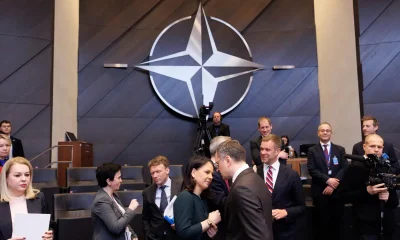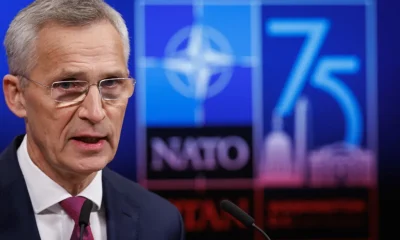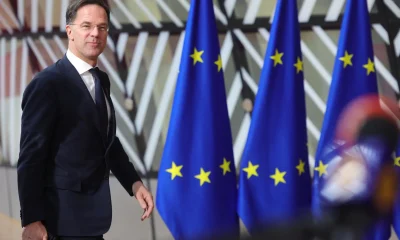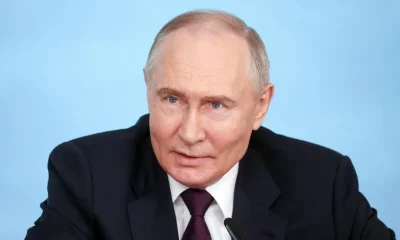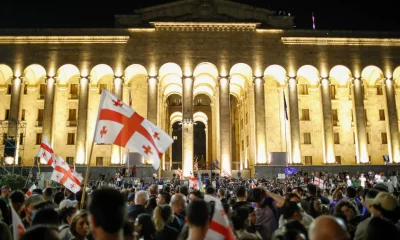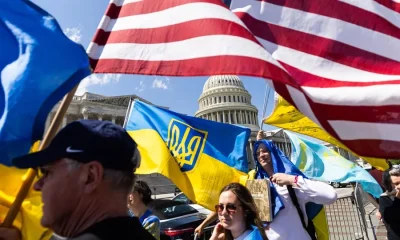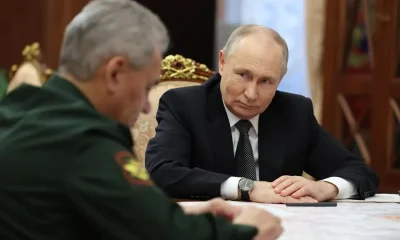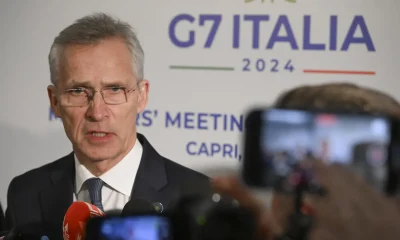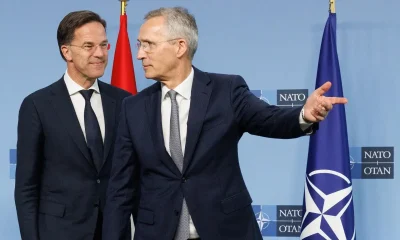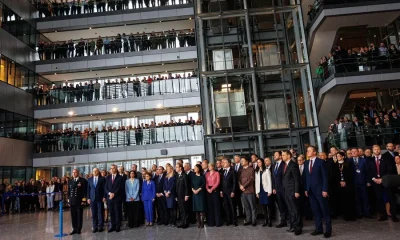International
Stoltenberg assures that NATO countries are willing to give more Patriots to Ukraine
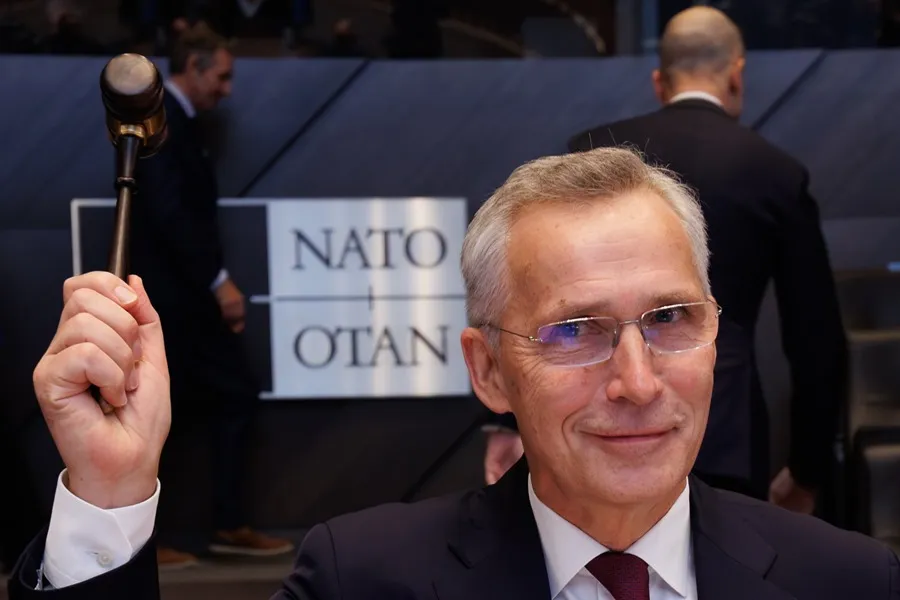
NATO Secretary General Jens Stoltenberg said on Thursday that the allies are willing to strengthen Ukraine’s air defenses, especially Patriot anti-missile batteries, after the specific request made today by the Ukrainian Foreign Minister, Dmitro Kuleba.
“The allies understand the urgency of accelerating when it comes to air defense, so they will now look in their inventories or if there is a way they can provide more systems, in particular Patriots,” Stoltenberg said at a press conference at the end of a two-day meeting of the Alliance’s Foreign Affairs heads.
At the same time, he said that it is necessary to make sure that the air defense systems that are already deployed in Ukraine “have the ammunition and spare parts to work as they should.”
“In part it is a question of battery systems, but it depends a lot on the delivery of the interceptors of the systems that are already there,” he explained.
Stoltenberg assured that several allies promised that they will make “a new effort to find what they can, see what else they can provide.”
The 32 allied ministers participated today in a meeting of the NATO-Ukraine Council after attending a ceremony to celebrate the 75th anniversary of the Atlantic Alliance.
“I don’t want to water the anniversary party, but my main message today will be Patriots, because saving Ukrainian lives, saving the Ukrainian economy, saving Ukrainian cities, depends on the capacity of the Patriots and other air defense systems,” Kuleba told the press upon his arrival at the meeting.
“The situation on the battlefield is still serious. Ukraine needs more air defenses, more ammunition and more help,” Stoltenberg stressed.
The Allied Secretary General listed that, in recent days, Germany has announced about 600 million euros for the Czech initiative to acquire artillery ammunition, the United Kingdom has announced the shipment of 10,000 drones to Kiev, France will give more missiles and armored vehicles and Finland will provide a new aid package worth 188 million euros.
“But we have to do even more. And we need to establish our support on an even firmer and more lasting basis,” he said.
Therefore, yesterday, Wednesday, the allied ministers agreed to move forward in the planning of a greater role of NATO in the coordination of aid and security training for Ukraine, a work that will continue in the coming weeks.
Stoltenberg indicated that the allies must move forward on these two aspects: the mobilization of urgent aid in the coming days and weeks and the establishment of “a more predictable framework for long-term support” that “does not depend on voluntary ‘ad hoc’ announcements, but on more predictable commitments.”
In this way, the allies have entrusted the supreme commander of the Alliance for Europe (SACEUR), American General Christopher G. Cavoli, start the planning of that framework, which “could be underpinned by financial commitments.”
Stoltenberg has proposed to create a fund of 100 billion euros for five years for Ukraine so that the support has a long-term journey, at a time when it is possible to return in November to the White House of Republican Donald Trump, who has already said that he would cut off attendance to Kiev.
“Russia is mobilizing more troops, but it is also willing to sacrifice men and material for marginal profits. This is serious, and that is exactly why it is urgent to mobilize more support for Ukraine,” argued the Norwegian politician.
He warned that there are fundamentally two possible scenarios: that the allies are able to mobilize more support and that Ukraine can recover more territory, or “that we are not able to do so.”
“And then there is a real risk that Russia will capture even more territory and that we will find ourselves in an even more dangerous position,” he said.
In his opinion, if NATO allies comply, he was convinced that Ukraine will be able to make new advances, and therefore “we must thoroughly seek and provide more military support” and put in place “stronger and more solid structures in the long term.”
Stoltenberg also insisted again that they have “no plan to have combat troops within Ukraine, there has been no request for it.”
The fact that the allies are providing him with weapons to defend himself “does not make us part of the conflict,” he said.
International
Football Fan Killed in Clashes After Colombian League Match
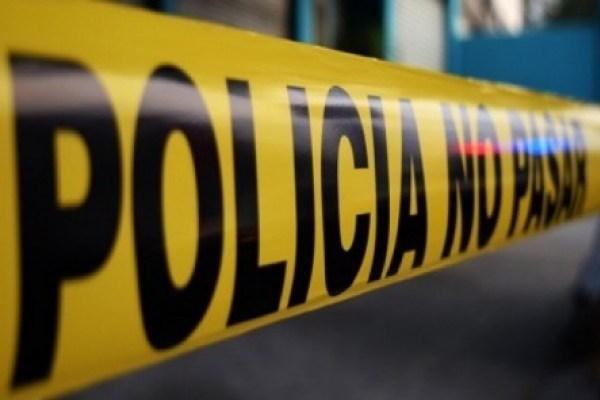
Fans of Cúcuta Deportivo and their traditional rivals Atlético Bucaramanga clashed outside the stadium following their local league match on Tuesday, leaving one supporter dead and several others injured.
The deceased fan was stabbed, according to a senior police official in Cúcuta who confirmed the cause of death in a video statement. Local media reported that the victim was a supporter of the visiting team, Atlético Bucaramanga.
The match ended in a 2-2 draw. Authorities had banned the entry of Atlético Bucaramanga’s organized supporters into the stadium in an effort to prevent disturbances.
Despite the restrictions, violence broke out in the surrounding areas after the game. Among the injured were three police officers, an institutional source told AFP.
The incident adds to a series of recent violent episodes linked to Colombian football. The most recent occurred in December, when supporters of Atlético Nacional and Independiente Medellín clashed in the stands and on the pitch, leaving 59 people injured.
International
Missing Spanish Sailor Rescued After 11 Days Adrift in Mediterranean

The man had departed from the port of Gandía, on Spain’s eastern coast, with the intention of reaching the southern Spanish town of Guardamar del Segura, a journey of about 150 kilometers, a spokesperson for Spain’s maritime rescue service told AFP.
Search boats and aircraft were deployed on January 17, but the operation was called off on January 22 after efforts proved unsuccessful. Alerts were then issued to vessels navigating the area in case they spotted any signs of the missing sailor.
As hopes were fading, a surveillance aircraft from the European Union’s border agency Frontex spotted the sailboat on Tuesday, along with a person signaling for help, approximately 53 nautical miles northeast of Bejaia, Algeria.
A nearby vessel, the Singapore-flagged bulk carrier Thor Confidence, carried out the rescue and is expected to bring the man to an end to his ordeal when it arrives on Thursday in the southern Spanish port city of Algeciras.
Maritime rescue services shared images on social media showing a small white sailboat drifting at sea and secured alongside the much larger ship.
It remains unclear how the sailboat ended up hundreds of kilometers off its intended route or how the man managed to survive for so long alone in open waters.
International
Rubio Says U.S. Could Participate in Follow-Up Russia-Ukraine Talks

The United States could join a new round of talks this week aimed at ending Russia’s invasion of Ukraine, Secretary of State Marco Rubio said on Tuesday.
Teams from Kyiv and Moscow met last Friday and Saturday in Abu Dhabi in their first publicly acknowledged direct negotiations to discuss the peace initiative promoted by former U.S. President Donald Trump.
“They are going to hold follow-up talks again this week,” Rubio told the Senate Foreign Relations Committee. “There could be U.S. participation.”
However, Rubio suggested that Washington’s role may be more limited than during last week’s discussions, which included Steve Witkoff, the president’s special envoy, and Jared Kushner, Trump’s son-in-law.
The secretary of state indicated that progress may have already been made on security guarantees for Ukraine, one of Kyiv’s key demands in any agreement with Moscow after nearly four years of Russian invasion.
“There is one remaining issue that everyone is familiar with, and that is the territorial claim over Donetsk,” Rubio said, referring to the eastern Ukrainian region that Russia wants Ukraine to cede.
“I know that active efforts are underway to see whether the positions of both sides on this issue can be reconciled. It remains a bridge we have not yet crossed,” he added during the hearing.
Rubio acknowledged that the territorial question would be particularly difficult for Ukraine to resolve.
-

 Central America2 days ago
Central America2 days agoGuatemala seizes over a ton of cocaine hidden in flour at Pacific port
-

 International5 days ago
International5 days agoTrump-Era Defense Plan Prioritizes Border Security and Scales Back Global Commitments
-

 International5 days ago
International5 days agoBogotá and Quito Seek Dialogue After Tariffs and Power Cut Escalate Tensions
-

 International4 days ago
International4 days agoDelcy Rodríguez seeks political agreements after Maduro’s ouster
-

 International2 days ago
International2 days agoHistoric snowstorm paralyzes Toronto after 60 centimeters of snow
-

 International2 days ago
International2 days agoSpain’s irregular migrant population rises to 840,000, study finds
-

 International4 days ago
International4 days agoFederal immigration agents kill man in Minneapolis, sparking protests and outrage
-

 Central America1 day ago
Central America1 day agoGuatemala Police Arrest Prison Guard Caught in the Act of Extortion
-

 Central America1 day ago
Central America1 day agoHonduras swears in conservative president Asfura after disputed election
-

 Central America1 day ago
Central America1 day agoBukele leads public trust rankings as UCA survey highlights gains in security
-

 Sin categoría1 day ago
Sin categoría1 day agoEight Killed in Series of Armed Attacks in Ecuador’s Manabí Province
-

 International1 day ago
International1 day agoDoomsday clock moves to 85 seconds before midnight amid rising global risks
-

 International1 day ago
International1 day agoWinter Storm Fern Leaves 30 Dead and Over One Million Without Power Across the U.S.
-

 International2 days ago
International2 days agoRights group says nearly 6,000 killed in Iran protest crackdown
-

 International1 day ago
International1 day agoSpain approves plan to regularize up to 500,000 migrants in Historic Shift
-

 Sin categoría1 day ago
Sin categoría1 day agoEl Salvador Launches Fourth Year of Ocean Mission to Protect Marine Ecosystems
-

 International2 days ago
International2 days agoVenezuela frees at least 80 political prisoners, NGO says
-

 International2 days ago
International2 days agoEU launches new probe into X over AI-generated fake nude images
-

 International7 hours ago
International7 hours agoRubio Says U.S. Could Participate in Follow-Up Russia-Ukraine Talks
-

 International7 hours ago
International7 hours agoMissing Spanish Sailor Rescued After 11 Days Adrift in Mediterranean
-

 International7 hours ago
International7 hours agoFootball Fan Killed in Clashes After Colombian League Match
-

 Central America7 hours ago
Central America7 hours agoGuatemala President Says Starlink Terminal Found Inside Prison
-

 International2 days ago
International2 days agoSevere winter storm grips U.S., leaves multiple dead as extreme cold persists
-

 International2 days ago
International2 days agoFrance debates ban on social media for children under 15

























